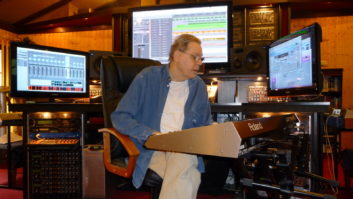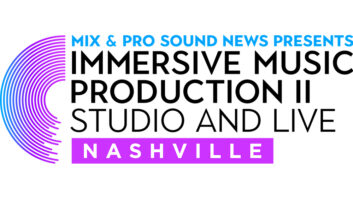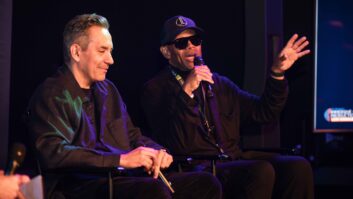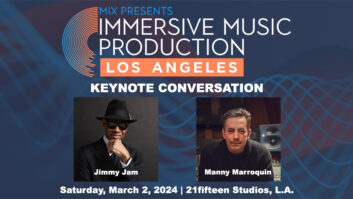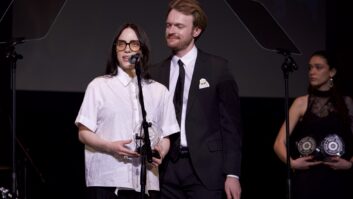
Hailing from Liverpool, England, Echo & The Bunnymen was among the first of the new wave troubadours to make their mark, emerging in 1980 with a lyrical, introspective sound that was all their own. Ian McCulloch’s talents quickly surfaced on some of their earliest hits, including “Seven Seas,” “The Killing Moon” and “Rescue”—the latter of which he wrote when he was just 19 years old.
Since then, the band has gone through many iterations, but McCulloch’s drive and creative influence have not waned. The group’s new album, The Stars, The Oceans & The Moon, comes out this October and features remakes of some of their classics, along with two new songs that live up to the band’s stellar legacy. Pro Sound News spoke to an upbeat McCulloch, who is touring the U.S. with the band this month.
On Song Choice
We have got a vast repertoire. I thought about doing an Eddie Cochran-style kind of thing on these songs but I didn’t think it stacked up properly. I didn’t want it to sound pastiche—especially if they are my own songs! By and large, I wanted to do songs that people knew, with a few surprises—like “Angels & Demons” and “Stars Are Stars,” which people perhaps wouldn’t expect. But I knew how I wanted to change them to make them sound more believable. I can’t listen to any of those old records anymore, not even Ocean Rain. With this album, the selection process came easy for me; I chose songs that were kind of personal, but I also wanted to bring people into the emotional side of the songs rather than just do the sing-along thing. I also wanted to attempt a remake of “The Killing Moon”—some of my loved ones were saying, “That’s a bloody dangerous thing to do.” But I thought, why is that? Other bands like Pavement have covered it and it didn’t seem dangerous. If anyone should be covering it, it should be me.
On Tracking Vocals

When I track vocals, I close my eyes and just get on with it. I try not to over-sing now, which I did in the past. I used to say, “I could do that better”—but it might be 12 takes down the line. The best take, though, is always among the first three. Most of the vocals on this album were done in one take, and I didn’t sing any song more than twice. Of all the voices that I’ve had, this is the one that I like the most, and some people don’t even get that. They think, “Holy smoke—all those ciggies?” But some people say, “That’s it—that’s the best he’s ever sounded.” Obviously I appreciate those kinds of comments more than someone else who says, “He doesn’t sing like he used to.”
On “Rescue”

I wrote “Rescue” when I was 19. I just felt shy and insular, not really knowing who I was. I came from a working-class family, or just below that, and there was this wall in the house that we lived in with my mom. She was always on the phone with the council, saying ‘There is all this black mold all over the sodding back wall.’ Nobody ever came out to fix it until one day the whole southern wall just fell off the back of the house. So then they rehoused us to this other place, and I wrote the lyrics to “Rescue.” I think I was always clever and smart, but that didn’t come out until I formed the band. That helped me to be not so shy.
Music, Etc.: Neko Case, Hell-On, by Jacques Sonyieux, April 30, 2018

On Lyrics
I’ve always been driven by the lyrics. The lyrics and the top line melody have always been the most important things to me. But things like “Changes,” “Oh! You Pretty Things,” “Life on Mars?” or any song off of Bowie’s Hunky Dory, I go “How the f–k did he write that?” Some of it sounds a little bit cheesy, but when you add Bowie’s voice in there, nobody else could sing those songs. I was also attracted to Leonard Cohen—who didn’t just sing “Help me if you can, I’m feeling down” [like The Beatles]; he sent me to another place altogether. I also liked Lou Reed, because you always knew who he was. I think it was on The Game, our fifth album, where there is a little bit that says “The world is a ball.” Will [Sergeant, guitarist] turned to me and said, “Hey, Mac, that sounds like poetry.” And that was like 10 years or so into Echo & The Bunnymen already. I thought, “What did you think I was doing with ‘The Killing Moon?’” It was unbelievable.
On Demos

I’ve always got loads of tunes in my head—20 at a time. Some might be slow and sad laments, but then I’ll have another rocker going on in the other side of my brain. I used to get chords and then sing a tune to them, or sing a tune and then work out the chords. Now I just store them all in my head, and some of the songs I don’t know what the chords are. Which could be a problem when I record them. But the new songs on the record were why we got signed to BMG—not just to redo old songs. We will have a new record full of new songs by next October, and I want that album to have a spike to it. I was always influenced by David Byrne, The Clash and Lou Reed, the godfather of rhythm, for example. I want that space and that spike, and that’s what the demos are sounding like right now. We’ve already got 30 songs down and will end up picking about 12 of them. It is beautiful stuff.
Jacques Sonyieux is a devout explorer of recording studios and the artists who occasionally inhabit them.
